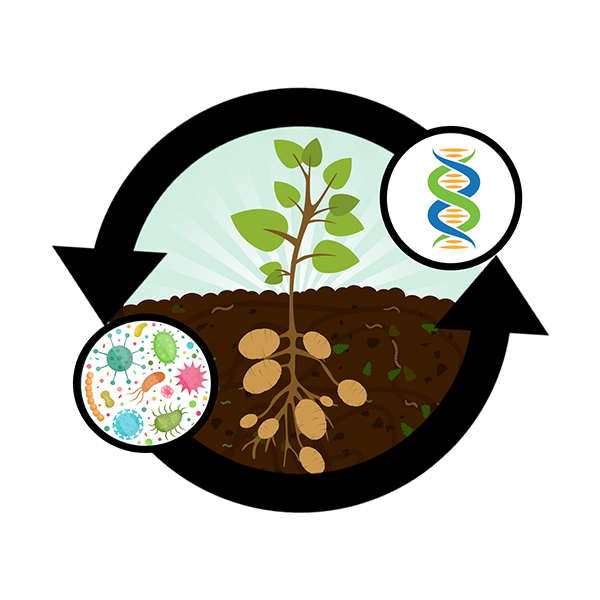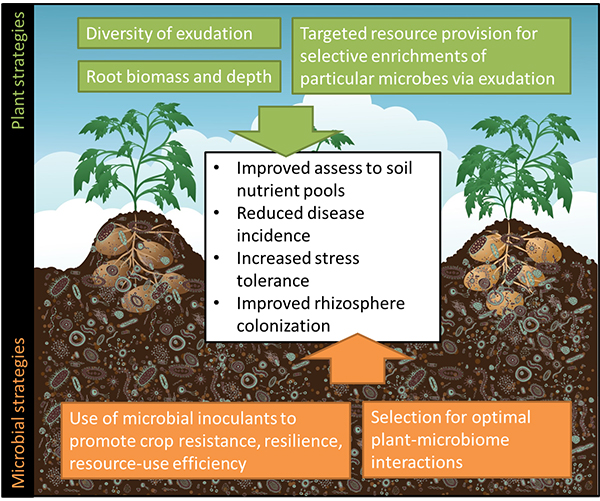Harnessing the potato-microbiome interactions for development of sustainable breeding and production strategies

Source: Joana Falcao Salles
Conventional agriculture relies heavily on high nutrient inputs as well as massive use of pesticides. In these systems, plants are considered as sole players, disregarding plant traits that can improve the recruitment of beneficial soil microbes for nutrient mobilization and plant protection. The concept of this project relies on the principle that plants naturally interact with beneficial (soil) microbes, making them less dependent on synthetic inputs. For instance, varieties with increased root biomass and carbon exudation should be able to recruit beneficial soil microbiota more efficiently than conventional varieties, selected to work alone and on high nutrient availability.
PotatoMETAbiome aims at identifying potato genotypes that interact effectively with the soil microbiome, and therefore show reduced dependencies on external inputs under non-stress as well as (a)biotic stress conditions. The project is composed of 4 main themes: 1) Support future breeding approaches by identifying markers associated with potato genotypes that efficiently interact with soil microbiome; 2) Development of novel integrated crop and pest management methods that consider interactions between plants and soil organisms; 3) Adapt and build resilience to (a)biotic stresses, by using biocontrol methods; 4) Evaluate the socio-economic and environmental impacts of the developed agronomic strategies

Source: Joana Falcao Salles
Main findings. Themes 1/2: we have performed a stepdown selection of Potato genotypes representing a wide range of microbiome-interactive traits (MIT). We started with a selection of 750 late potato genotypes, characterized mostly by their ability to resist several pathogens. From those we selected 150 that were grown in vitro conditions, in the absence of microorganisms, and characterized in terms of their root exudation (quality and quantity). These results lead to the selection of 50 genotypes representing a wide distribution of MITs, which were tested in a greenhouse experiment, in natural soils, to verify their ability to select soil microbiome (bacteria and fungi). An additional greenhouse experiment performed in Poland also provided information on how these genotypes responded to drought and pathogen stress. Although the full microbiome characterization of these genotypes, in terms of microbiome interactions and associated plant metabolomics and transcriptomics, have not been finalized yet due to the delays caused by the COVID, our preliminary results are very promising. For instance, we observed a great variability in microbiome association, resistance to stress and root and shoot biomass, among the 50 potato genotypes, suggesting that the future identification of plant associated will be successful. Theme 3: we have characterized a large number of bacterial consortia aiming at improving potato biotic resistance. These have been tested both in vitro and in vivo, using a selection of common potato varieties, showing very promising results. The best consortia will be further tested on the selection of genotypes generated by themes 1 and 2. Theme 4: preliminary results associated with theme 4 were largely postponed due to COVID. Despite the delays associated with the pandemic, we are positive that PotatoMETAbiome will contribute to the achievement of sustainable potato cropping by integrating biological, social, economic and environmental dimensions while addressing smart breeding strategies, sustainable production and climate challenges.

Source: Joana Falcao Salles
Prof Joana Falcao Salles
University of Groningen, Groningen Institute for Evolutionary Life Sciences (GELIFES), Microbial Ecology cluster, NETHERLANDS
Email: j.falcao.salles@rug.nl
Prof Michael Schloter
Technische Universität München, Wissenschaftszentrum Weihenstephan Chair for Soil Science, GERMANY
Prof Gabriele Berg
Graz University of Technology, Institute of Environmental Biotechnology, AUSTRIA
Dr Achim Schmalenberger
University of Limerick, Biological Sciences, IRELAND
Dr Eleonore Attard
Université de Pau et des Pays de l'Adour, IPREM, UMR 5254 CNRS/UPPA, FRANCE
Dr Mariusz Maciejczak
Warsaw University of Life Sciences – SGGW, Faculty of Economic Sciences, POLAND
Prof Magdalena Frąc
Institute of Agrophysics, Polish Academy of Sciences, Department of Soil and Plant System, POLAND
Dr Krzysztof Treder
Plant Breeding and Acclimatization Institute - National Research Institute, Bonin Research Center, POLAND
Dr Dirk Hincha
Max-Planck-Gesellschaft zur Foerderung der Wissenschaften e.V., Max Planck Institute of Molecular Plant Physiology, Potsdam, GERMANY
2023
Maciejczak, M., and Filipiak, T. (2020). Economic, social and environmental impacts of the potato and its beneficial microorganism interaction. Annals of the Polish Association of Agricultural and Agribusiness Economists, 22 (4), 140-149.
Maciejczak, M. (2022). The role of biological knowledge in the development of sustainable bioeconomy – case of potato and its beneficial microorganisms interactions. Annals of the Polish Association of Agricultural and Agribusiness Economists, 24 (2), 74-84.
2022
Frąc, M., Hannula, E.S., Bełka, M., Falcao Salles, J., and Jedryczka, M. (2022). Soil mycobiome in sustainable agriculture. Frontiers in Microbiology, 13.
Mawarda, P. C., Mallon, C. A., Le Roux, X., van Elsas, J. D., and Salles, J. F. (2022). Interactions between bacterial inoculants and native soil bacterial community: the case if spore-forming Bacillus spp. FEMS Microbiology ecology, 98 (12), 127.
Mawarda, P. C., Le Roux, X., Acosta, M., van Elsas, J. D., and Salles, J. F. (2022). The Impact of Protozoa Addition on the Survivability of Bacillus inoculants and Soil Microbiome Dynamics. ISME communications, 2, 82.
Mawarda, P.C., Lakke, S.L., van Elsas, J. D., and Salles, J.F. (2022). Temporal Dynamics of Soil Bacterial Community Following Bacillus Invasion. iScience, 25, 104185.
Liu, X., Le Roux, X., and Salles, J. F. (2022). Functional interactions behind microbial invasion and their consequence for soil ecosystem processes. iScience, 25, 10382.
2021
Treder, K., Michałowska, D., Pawłowska, A., Urbanowicz, J., Panek , J., Frąc, M., and Falcao Sales, J. (2021). International project potatoMETAbiome – description of the work performed (in Polish). Ziemniak Polski, 2, 3-9.